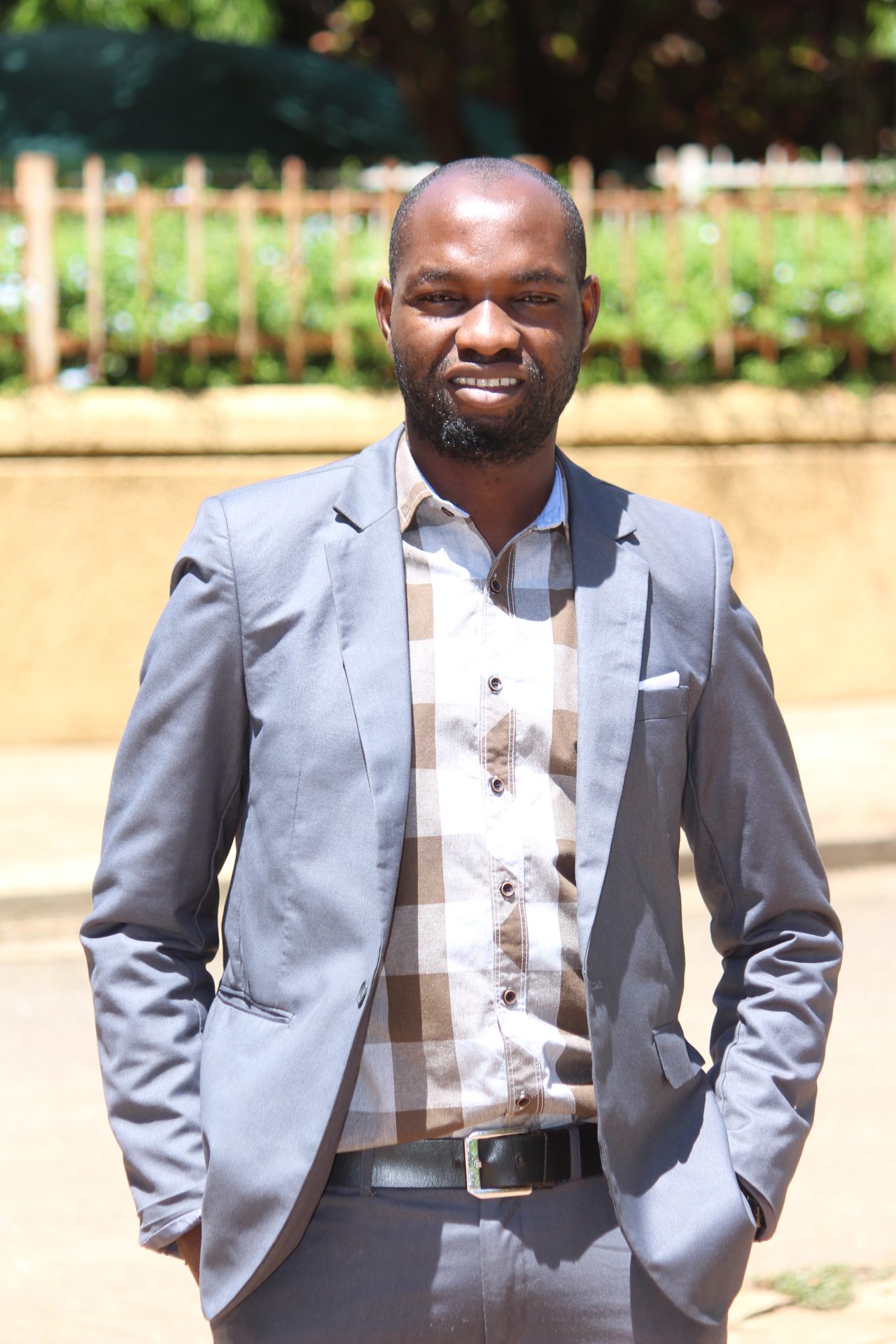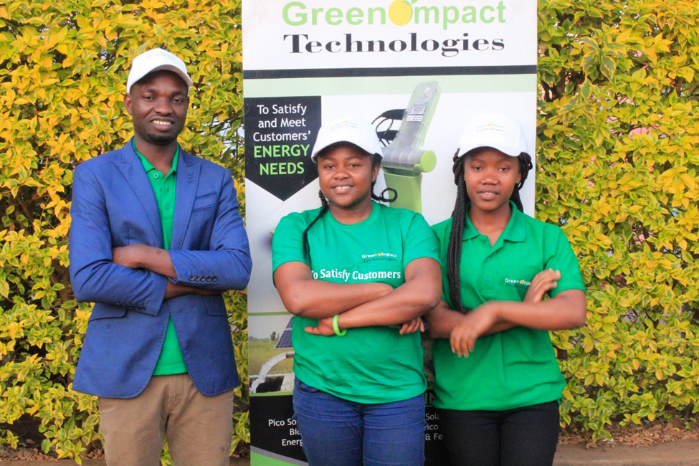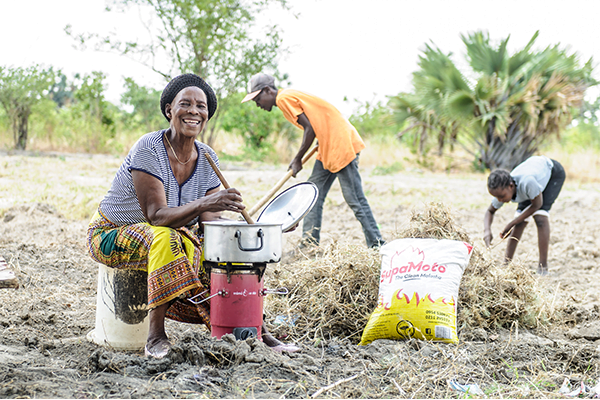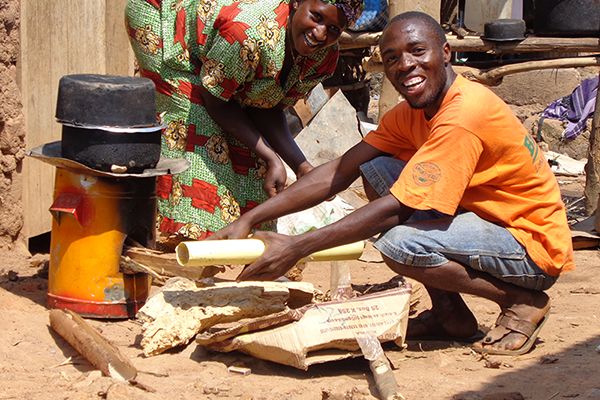
Admore Chiumia grew up in rural Malawi, 30 kms away from the nearest town. His family used kerosene for lighting and he watched his mother walk long distances to collect firewood for cooking. When his uncle in South Africa sent them a phone in the late 1990s, the family had to travel 10 kms twice a week to charge the phone at a neighbor’s house with solar panels.
The way I was brought up is the way many communities are in Sub-Saharan Africa. The grid is only connected to 11% of the population in Malawi, so the majority lack energy for cooking, energy for transforming their lives. I thought, this is a problem and now I have to come up with a solution.
While studying renewable energy technologies at Mzuzu University, Admore began working at Solar Aid Malawi and getting hands on experience with solar PV and pico solar products. After graduation, he joined a research project on energy poverty and the market for rural electrification at Community Energy Malawi. Admore also coordinated advocacy campaigns on SE4ALL and conducted technical training for community-based organizations. This led to him being selected for the Mandela Washington Fellowship for Young African Leaders, through which he got the chance to study at UC Davis and work at California Independent Systems Operator. It was during this period that Admore decided to start his own business.
My prior understanding was a bit narrow. I had knowledge of how solar and other energy systems work, but I didn’t have exposure to an entrepreneurial mindset. In the fellowship I learned about things like a business plan and how to define a market segment. There I gained an understanding of what others are doing and how they formed a company.
When Admore returned to Malawi, he was determined to be an entrepreneur but he knew that he needed more experience and resources. For the next few years, he focused on building his capacity and networks. He worked with international organisations providing technical assistance, such as Practical Action and Tetra Tech International, and engaged with energy companies working in Malawi. Admore also conducted market research to identify potential partners and inform the development of his value proposition and fundraising plan. His vision was to achieve impact plus return on investment, and for that he knew he needed good data.
In 2018, Admore created Green Impact Technologies (GIT) and was later was joined by business partner Joyce Sikwese, beginning with solar home systems and biogas. At that time, there were very few companies in this space in Malawi and the market analysis showed a need for basic household energy (lighting, phone charging, communications) and alternative fuels for cooking. Biogas was an area of particular interest for Admore. He knew that almost 180 million tonnes of waste is generated in Africa each day, and the majority of that is organic waste. The key question he asked when he started the company was ‘How can we turn waste into wealth?’.
It was very hard to start the business and there were a lot of rejections along the way. The landscape doesn’t allow a start-up much chance to access financing. I went to the banks and they said they can’t give me money. Some said I was too young and this vision is too big.
The first two years of GIT’s operations focused heavily on organisational capacity building and product testing. Admore understood that building a motivated team and connecting with like-minded partners was critical to success. He used feedback from rejected financing applications to identify gaps and shortcomings in areas such as financial management. The team also attended trainings and webinars to strengthen their skillsets, understand what investors want, and identify opportunities. Above all, there was continuous product development to find the right market fit and data collection to gather evidence on biogas systems and investment results.
At the beginning, I didn’t pay attention to record keeping and financial management. I was looking mainly at sales and I failed to win some projects because I had weak internal controls. I would encourage a new entrepreneur to recruit a financial administrator first, and make sure their books are right from the start. You need to be able to account for how the money moves and assure financing partners that their funds will get to the end users and create impact.

GIT is now gaining strong traction in the sector and moving into a scale up phase. By the end of 2021, the company had reached over 25,000 off-grid households, raised over USD 700,000 in grants and debt financing (from EEP Africa among other funders), and been recognized by the Africa SEED Awards and the Tony Elumelu Entrepreneurship Award. One of GIT’s main achievements has been establishing a food waste-to-energy plant at the Tsangano vegetable market that is producing biogas for local restaurants and biofertilizer for smallholder farmers.
The company is also developing energy hubs where people in a community can access solar water pumps, improved cookstoves, and other technologies on a PAYG basis. GIT conducted interviews with over 1,000 customers and found that most already had SHS; they were now in need of technology for farming and clean cooking. Based on this, the company is transitioning away from lighting and placing more focus on productive use of energy and systems that improve agricultural productivity and food security.
Admore’s vision for GIT is that it provides any type of energy that can simplify a process or transform somebody’s life through savings. He is driven to find where the company can make the most impact and help eradicate poverty in his own and neighboring countries. With this model and market-based approach, Admore aims to transform Malawi through technology and investment.
In the coming years, I want to continue improving the livelihood of smallholder farmers and households within our country and beyond. We want to bring products that are fit for the customer and markets in which we operate. We will continue to innovate so that we get more value for products, value for money, and scaling in terms of impact with these community solutions. Our goal is to be a leading energy company in Sub–Saharan Africa.
Admore Chiumia is a dynamic leader with a decade of professional experience working to expand the delivery of clean energy solutions in Malawi and beyond. Beyond his credentials on paper, he is incredibly passionate about using his time and skills to improve the lives of people living in poverty. Within the first five minutes of speaking with him, you feel his dedication to serve others. He has led his team to be equally purpose-driven: impact is at the center of everything they do, and it shows. The Green Impact Technologies team carefully designs each project to meet the needs of their customers, and their growth reflects the success of this impact-driven and customer-centric approach.
Bethany Larsen – Chief Investment Officer, Charm Impact
Clean Cooking Solutions Save Time and Money
Customers of Supamoto's clean cooking solutions on the impact for Zambian households...
A Community Empowerment Approach to Clean Energy
Profile of Ziwa Hillington, Managing Director at Green Bio Energy...




